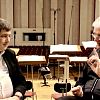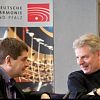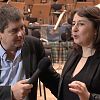backstage
CHARLES KOECHLIN - Symphony No. 1, Op. 57bis.
Explore the fascinating journey of Charles Koechlin's First Symphony, from its century-long obscurity to a landmark recording. Discover the dedication of conductor Ariane Matiakh and the unique musical world of this French composer, blending Bachian counterpoint with impressionist flair.
Johannes Kernmayer (Producer / Interview) · Bern Hanke (Recording Supervision) · Philippe Ohl (Video Operator) · Axel Stummer (Video Edit)
Youtube
NINO ROTA - beyond The Godfather
Explore the life and works of Nino Rota, the Italian composer known for his film scores and classical compositions. Discover his collaborations with famous directors, his opera "The Florentine Straw Hat," and his unique ability to blend nostalgia, optimism, and humor in his music.
Youtube
MIKLÓS RÓZSA: Sinfonia concertante Op. 29
Discover the rarely performed symphonic masterpieces of Miklós Rózsa in this captivating release. Journey through the composer's musical evolution, from his early Rhapsody for Cello to the nostalgic Notturno Ungherese and the challenging Sinfonia concertante. Known for his iconic film scores like Ben-Hur, Rózsa's concert works showcase his true artistic depth. Experience the fiery passion of the Rhapsody for Cello, where Rózsa found his distinctive voice. Let the Notturno Ungherese transport you to the composer's childhood memories of Hungary. Marvel at the technical brilliance of the Sinfonia concertante, a work commissioned by legends Gregor Piatigorsky and Jascha Heifetz but never performed by them. Featuring the exceptional talents of cellist Harriet Krijgh and violinist Nikita Boriso-Glebsky, this recording brings Rózsa's underappreciated concert works to life. Immerse yourself in the rich, emotive world of one of the 20th century's most versatile composers. Don't miss this opportunity to explore the lesser-known side of Miklós Rózsa's musical genius. Like, comment, and subscribe for more hidden gems of classical music!
Youtube
KARL WEIGL - Viennese Glory and American Obscurity
Discover Karl Weigl, a forgotten Viennese composer who upheld romanticism in the 20th century. Join Jens and Joe on Classical Discoveries as they explore Weigl's life and legacy. Learn about his early career under Mahler, his "Mahler without the neurosis" style, and his impressive output, including symphonies and string quartets. Hear about his struggles as an émigré in the US and the rediscovery of his music, featuring insights from his grandson and excerpts from works like his left-hand piano concerto and Third Symphony. Discover why Weigl deserves a place in the modern repertoire. Subscribe for more hidden classical gems!
with: Jens F. Laurson (Journalist) · Johannes Kernmayer (Capriccio) Video Operator: Martin Klebahn / 4tune Studios
Youtube
CHRISTMAS CLASSICS - beyond J. S. Bach
and many more
Join Jens and Joe on Classical Discoveries for a festive exploration of Christmas music beyond Bach! Discover hidden gems like Pfitzner's "Christelflein," Rheinberger's "The Star of Bethlehem," and Cartellieri's Christmas Oratorio. We'll journey from Renaissance masterpieces to Romantic treasures, featuring works by Mendelssohn, Saint-Saëns, and even Sibelius. Prepare for unexpected delights like Schoenberg's "Christmas Music" and Pablo Casals' "El pesebre." We'll also delve into the beauty of Russian Orthodox Christmas music, sharing personal stories about performing and recording these magical pieces. Whether you're a seasoned classical enthusiast or simply seeking new additions to your holiday playlist, this episode offers a fresh perspective on Christmas music. Join us as we unwrap these musical gifts, share favorites, and even attempt "Silent Night"! Don't miss this opportunity to discover new Christmas classics! with: Jens F. Laurson (Journalist) · Johannes Kernmayer (Capriccio) Video Operator: Martin Klebahn / 4tune Studios
Youtube
MIKLÓS RÓZSA – beyond Ben Hur
Gregor Bühl
In this episode, we explores the life and work of composer Miklós Rózsa, focusing on his "double life" navigating both film scoring and concert hall composition. Rózsa, initially resistant to film work, achieved significant success in Hollywood, winning three Academy Awards for scores like Ben-Hur, Spellbound, and A Double Life. The podcast hosts discuss Rózsa's autobiography, highlighting his complex feelings about his film career versus his aspirations as a "serious" composer. They contrast him with composers like Shostakovich, who seemed less concerned with such distinctions. The episode emphasizes Rózsa's strategic use of film scoring to fund his concert works, allowing him unique contractual freedoms, such as dedicating summers to composing concert pieces in Italy. The hosts play excerpts from several of Rózsa's concert works, including the impulsive Overture to a Symphony Concert, the Hungarian Serenade, and the Sinfonia Concertante, noting stylistic overlaps with his film scores. They also touch upon his connections with prominent conductors like Bernstein and Bruno Walter, and soloists like Heifetz and Starker, further illustrating his success and influence in the classical music world. Throughout the conversation, the hosts grapple with the inherent biases against film composers and champion Rózsa's contributions to both genres. with: Jens F. Laurson (Journalist) · Johannes Kernmayer (Capriccio) Video Operator: Martin Klebahn / 4tune Studios
Youtube
CHRISTIAN SINDING - Romantic Symphonies from the North
Karl-Heinz Steffens
One of my most surprising trips and recording at the beautiful North. Surprised by the Beauty of the Landscape, the fantastic concert Hall in Norrköping and ofc. the excellent performance of the Norrköping Symphony Orchestra. Last not least surprised of these late-romantic symphonies by Christian Sinding, who – honestly – for me was only known by his "Rustle of Spring" piano piece. Christian Sinding was a more important figure in the music of his native Norway than this might suggest; there, in his time, he was second only to Grieg. Trained in Leipzig, he fell under the influence of Liszt and Wagner, producing a large quantity of music that, although it enjoyed contemporary popularity, remains forgotten in today’s concert programmes.
Recording: Norköpping, De Geerhallen · Recording Supervision: Roland Kistner · Video Operator: David Tarrodi · Video Edit: Axel Stummer Interview: Johannes Kernmayer
Youtube
The PROGRAM DIRECTORS - How to keep Audiences away from Concert Halls
Cornelius Meister · Ariane Matiakh
For this Episode we welcomes Dr. Christoph Becher, former dramaturg and general director, to explore the complexities of curating a concert season. He reveals the three-pronged approach involving the orchestra chief, guest conductor, and presenter, each with differing priorities. This episode delves into the challenges radio symphony orchestras face in balancing their mission to promote contemporary music with audience appeal. Dr. Becher shares anecdotes from his career, including championing Henze's "Raft of the Medusa" and dealing with hesitant presenters. The conversation explores audience perceptions of modern music, the difficulties of programming Schoenberg, and the unexpected resistance to even accessible romantic composers like Dohnányi. Dr. Becher's forthcoming book on Schoenberg, designed to make his music more approachable, is also discussed. The episode concludes by highlighting Dr. Becher's innovative work at renowned institutions, including a Hamburg series featuring surprise contemporary pieces, and collaborations on projects like Dvořák's "The Spectre's Bride." with: Jens F. Laurson (Journalist) · Johannes Kernmayer (Capriccio) · Dr. Christoph Becher (Program Director) Video Operator: Martin Klebahn / 4tune Studios
Youtube
BEETHOVEN vs. MAHLER - liked or disliked retouchings?
Michael Francis
The influence of Gustav Mahler on the performance practice of Beethoven's symphonies is explored in this episode. Mahler's "retouchings," undertaken to adapt Beethoven's works for the larger orchestras and concert halls of his time, are examined in detail. The discussion considers the implications of these revisions for modern interpretations of Beethoven's symphonic repertoire.
with: Jens F. Laurson (Journalist) · Johannes Kernmayer (Capriccio) Video Operator: Martin Klebahn / 4tune Studios
Youtube
CLASSICS behind the WALL
Conrad Muck · Kurt Sanderling
In this episode of “Classical Discoveries,” I try to explore with Jens East Germany’s (GDR) musical landscape before the Berlin Wall fell, also discuss the high cultural prestige in the GDR, featuring interviews with musicians like Olaf Bär and Christine Schornsheim. The episode highlights the use of music for propaganda, the secure yet politically constrained lives of musicians, and notable figures like Kurt Sanderling and Hanns Eisler. It also covers significant recordings and the challenges of producing music in the GDR.
Video Operator: Martin Klebahn















